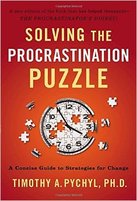|
After becoming aware of Canadian researcher Timothy A. Pychyl's blog Don't Delay, which discusses the science behind procrastination, I purchased Solving the Procrastination Puzzle: A Concise Guide to Strategies for Change, a short (by design) presentation of his team's research, formulated into practical advice on how to break our most entrenched task completion habits.
As expected, on Monday when participants were avoiding some task(s) in preference to others, we found that they typically said things like, "I'll feel more like doing that tomorrow" or "Not today. I work better under pressure." We rationalize the dissonance between our behaviors (not doing) and our expectations of ourselves (I should be doing this now). Later in the week few, if any, participants spontaneously said things like "I feel like doing that [avoided task] today" or "I'm glad I waited until tonight, because I work better like this." More surprisingly, we found a change in the participants' perceptions of their tasks. On Monday, the dreaded, avoided task was perceived as very stressful, difficult, and unpleasant. On Thursday (or make that in the wee hours of Friday morning), once they had actually engaged in the task they had avoided all week, their perceptions changed. The ratings of task stressfulness, difficulty and unpleasantness decreased significantly. What did we learn? Once we start a task, it's rarely as bad as we think. In fact, many participants made comments when we paged them during their last-minute efforts that they wished they had started earlier - the task was actually interesting, and they thought they could do a better job with a little more time. Given the large costs often involved, why, then, do we habitually procrastinate? A flash of insight occurred while reading Give in to Feel Good--another of his popular blog entries--which reframes task avoidance as an attempt at short-term mood repair. This also shed some light on the difficulty those struggling with depression and anxiety have with facing unpleasant tasks: if your mood is already low, avoidance will be a compelling short-term method to regulate your level of distress.
Like many instant gratification techniques, however, the long-term consequences eventually become greater than the immediate rewards. My clients have reported that applying the simple insight of "I don't actually have to be in the mood in order to get started on something," has been helpful in shifting their long-standing patterns of work avoidance, and thus reducing the costs of that avoidance. Check out Dr. Pychyl's blog and his book for more great insights and tips, and please feel free to share your own! * Just kidding! Therapists never procrastinate :)
0 Comments
Leave a Reply. |
Jessica Katzman, Psy.D.I'm a psychologist with a private practice in San Francisco's Castro District. I'm interested in harm reduction, LGBTQQIAAP issues, psychedelic integration, social justice conversations, size acceptance, and any intersections of the above. I welcome your comments! Categories
All
Archives
June 2020
Disclaimer: The information and resources contained on this website are for informational purposes only and are not intended to assess, diagnose, or treat any medical and/or mental health disease or condition. The use of this website does not imply nor establish any type of therapist-client relationship. Furthermore, the information obtained from this site should not be considered a substitute for a thorough medical and/or mental health evaluation by an appropriately credentialed and licensed professional. This website includes links to other websites for informational and reference purposes only. This website does not endorse, warrant or guarantee the products, services or information described or offered at these other websites. Examine the content carefully.
|


 RSS Feed
RSS Feed